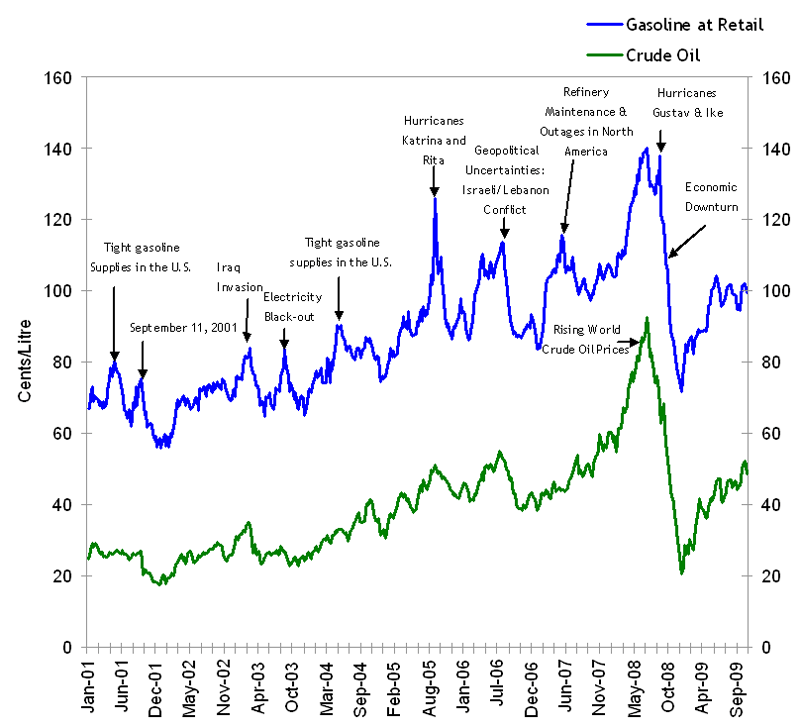My friend from Alberta sent out a group text this morning: a photo of a snow-dusted gasoline pump display with “99.9” glowing in the cents/litre screen.
A few minutes later, my phone buzzed with another text, “Wow Ottawa is at 100.9…pretty close”. After my initial, “what is this witchcraft?”-reaction, I did a bit of perusing and found that apparently gas prices were predicted to drop over the holiday season. The internet rejoiced! All was saved! But the thing is, gas prices are never going to really drop; the demand is too great for the supply. The changes we’re seeing are just relative to horrifying peaks that occur during the summer months, which are cyclical anyway.
It got me wondering about the factors influencing gas prices.
Currency strength influences regional markets. The weaker Canadian dollar, for example, is cited as one of the reasons why Canadians pay about 30% more for gas than Americans. Local governmental subsidies are another factor. And while taxes, distribution and marketing, and the cost of refining all play a role, the price of crude oil is the biggest influence. It’s 50% of gas’s cost, in fact.
Alright, so what influences the cost of crude oil? A lot of it is supply and demand. The higher the demand, the higher the price. And not just North American and European demand. As developing Asian nations like China and India become bigger players in the international world-stage, improved standards of living for their populations drives a higher demand for gasoline within their borders and therefore, internationally. Moreover, despite the growing research into alternative fuels, biogasolines, and gasolines from non-petroleum sources there isn’t really much else we can use to run our cars on the market. So no matter the price, people will pay. We’ll gripe and moan, but we’ll pay. Seasonal increases in gas price don’t decrease consumption and so the price will keep rocketing up.
On top of that whole demand-issue, few countries actually produce oil. The Organization of Petroleum Exporting Countries (OPEC) is made up of only eleven members, predominantly from the Persian Gulf. While some non-OPEC countries produce oil, they do it at a far lower scale.
These OPEC countries have a huge say in international oil prices. Unsurprisingly, international climate plays a huge role in the global fluctuations in crude oil price, as well. Political upheavals, natural disaster and war all impact the cost of crude oil.

Natural Resources Canada: Crude Oil and Gasoline prices- a timeline http://bit.ly/1wJ6XYP
There’s a part of me that wonders whether we can even get off this train. If we can unhitch ourselves from this dependence on gasoline sold at ever increasing prices. Fuel-efficient vehicles are in higher demand when gas prices skyrocket, but the fervour is short-lived once prices recede again. And for some people, fuel efficiency doesn’t factor into the decision about purchasing a car, performance is more important. So perhaps automakers need to develop “good cars” that are also fuel-efficient, rather than just creating fuel-efficient cars.
Gas prices are going down this season at a relative level but not absolutely. Next summer they’ll go up again to widespread shock. And until a cost-effective alternative comes to market, the prices will keep going up.
________________________________________________________
Gap between Canadian-US gas prices is biggest on record: http://www.ctvnews.ca/canada/gap-between-canadian-u-s-gas-prices-is-biggest-on-record-report-finds-1.1835270
Understanding Gasoline Prices: http://www.gao.gov/new.items/d05525sp.pdf
Canadian Fuels Association: http://canadianfuels.ca/en/fuel-markets-and-pricing
Natural Resources Canada: Crude oil and Gasoline Prices: http://www.nrcan.gc.ca/energy/fuel-prices/4599


No Comments